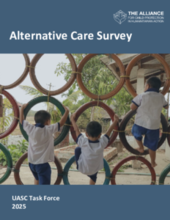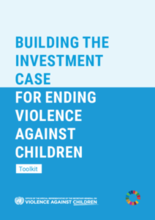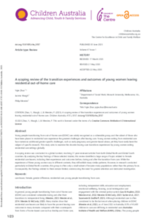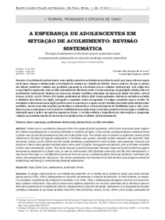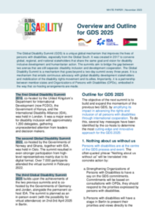Displaying 141 - 150 of 4431
The VACS Data Dashboard is a comprehensive online tool designed to provide easy access to data from the Violence Against Children and Youth Surveys (VACS) across more than 20 countries.
This free course offers a comprehensive curriculum addressing the unique challenges faced by children in refugee, internal displacement, and international migration contexts. The curriculum is designed as a stand-alone module that can be incorporated into existing social work curricula or national training programs for frontline social service workforce members. The material is most appropriate for those with foundational case management skills and providing direct services in countries with large populations of children on the move.
Children affected by conflict, displacement, and disasters face heightened risks of family separation, underscoring the need to strengthen alternative care systems. To update and adapt the Alternative Care in Emergencies (ACE) Toolkit to current realities, the Alliance for Child Protection in Humanitarian Action’s Unaccompanied and Separated Children Task Force conducted a 2024 global survey—led by Save the Children and the International Rescue Committee—to inform revised, context-responsive guidance and address emerging policy and practice gaps.
This toolkit, building on prior research, presents the economic rationale for investing in the prevention and response to violence against children, emphasizing that such spending should be seen as an investment rather than a cost. Part A outlines the societal and economic benefits of preventing violence, while Part B provides a step-by-step guide for practitioners to develop evidence-based investment cases to persuade governments to adopt integrated, cross-sectoral strategies.
This scoping review analyzes 31 studies on young women leaving residential care worldwide, highlighting their unique gender-specific challenges such as early pregnancy and gender-based violence. Despite recurring patterns across contexts, research on this group remains limited, especially as they are often treated as a subset of broader studies, pointing to the need for more focused investigation.
O acolhimento institucional é uma medida protetiva no âmbito da assistência social, que busca oferecer apoio social para crianças e adolescentes em situação de ameaça ou violação de direitos.
In this webinar organised by ECPAT focused on efforts to regulate voluntourism to protect children, the first global case study with actionable models and experiences from sending and destination countries will be launched.
The objective of the next summit is to build and expand the momentum of the previous two GDS, by amplifying its impact in advancing the rights and inclusion of all persons with disabilities through international cooperation.
1 in 4 children globally live with a mother or female caregiver experiencing intimate partner violence.

